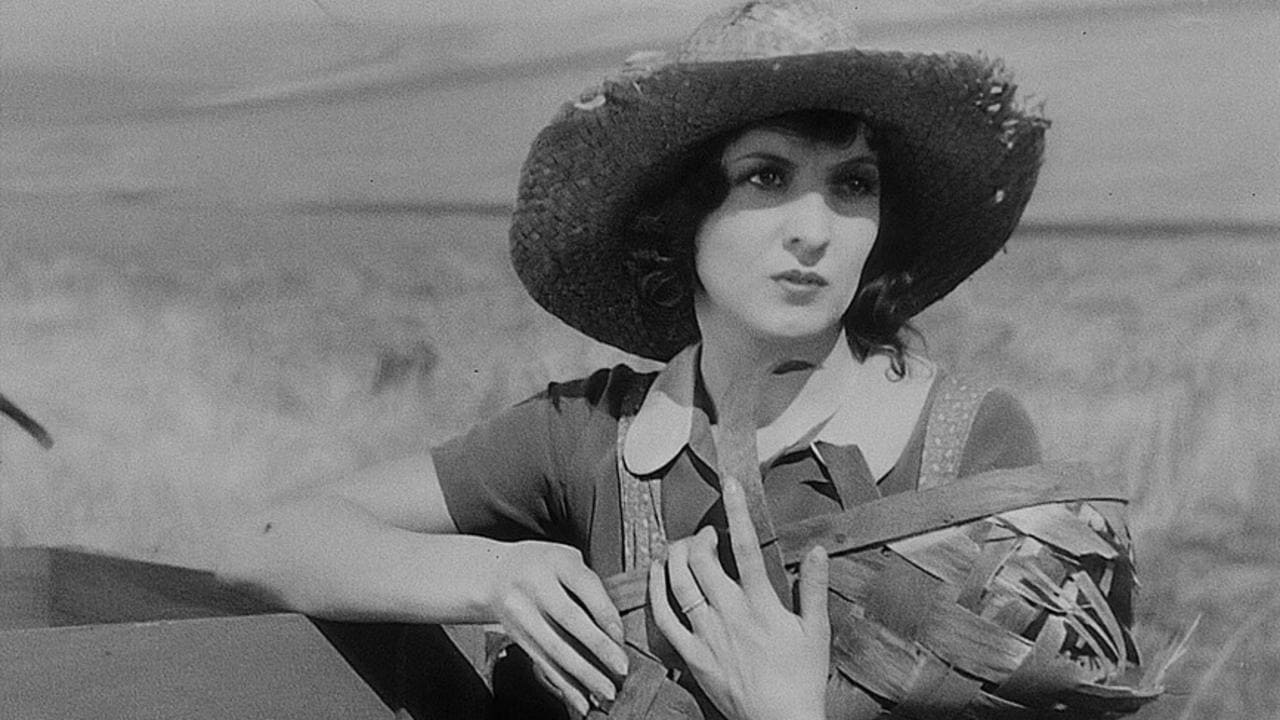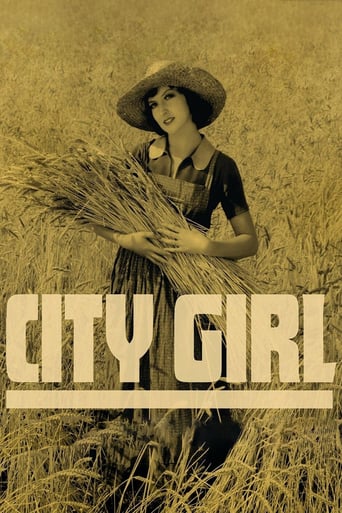KnotMissPriceless
Why so much hype?
Ketrivie
It isn't all that great, actually. Really cheesy and very predicable of how certain scenes are gonna turn play out. However, I guess that's the charm of it all, because I would consider this one of my guilty pleasures.
DipitySkillful
an ambitious but ultimately ineffective debut endeavor.
Catherina
If you're interested in the topic at hand, you should just watch it and judge yourself because the reviews have gone very biased by people that didn't even watch it and just hate (or love) the creator. I liked it, it was well written, narrated, and directed and it was about a topic that interests me.
JohnHowardReid
Copyright 10 January 1930 by Fox Film Corporation. U.S. release: 16 February 1930. 8,217 feet. 91 minutes. SYNOPSIS: A farm boy arrives in Chicago to sell his father's wheat crop, falls for a waitress, marries her and takes her home to Minnesota. His father does not approve and tries to come between the boy and his bride.NOTES: Filmed as a silent-fortunately Murnau's original cut of the movie survives-City Girl was then considerably tinkered with by studio management in order to turn it into a part-talkie, with disastrous results.
The stage play opened on Broadway at the Bijou on 20 August 1925 and ran a modestly successful 52 performances. Helen MacKellar and Buford Armitage starred; Willard Mack directed.COMMENT: Beautifully filmed, superbly acted (particularly by Charles Farrell and Mary Duncan) romance of the wheatfields, the silent version is available on an excellent DVD from Grapevine Video. The city scenes are so startling in their impressionistic (but nonetheless hectic) pace, which all comes to a charming coda when the lovers meet, we wonder what Murnau is holding in reserve to beguile us back on the farm. We're not kept long in suspense. After a lyrical introduction as the lovers run through the wheat fields, we are brought down to earth when miserly in words, deeds and manner David Torrence comes back on the scene. How these three clashing personalities resolve their differences is worked out forcefully, if a little melodramatically, but nonetheless in a satisfyingly picturesque manner, thanks equally to the consummate skill of F.W. Murnau in staging, the engrossing acting of the principals, and the superbly lit camerawork of Ernest Palmer.
sosuttle
Principally I write to let my fellow silent-film fans know that the new release (Oct. 1, 2015; UPC 024543991151)by Fox Cinema Archives does contain the wonderful score composed by Christopher Caliendo. Often the soundtrack can make or break a release and the music here is wonderful. It is the same as found on the earlier and quite expensive Murnau, Borzage and Fox box set. Secondly, I would take issue with those who have said here that City Girl is not up to Murnau's earlier standards. In that regard I would point out that every Van Gogh is not "Starry Night." I agree that this film is not a masterpiece like Sunrise or The Last Laugh, but it is nonetheless a terrifically rendered film. The cinematography is stunning as is the art direction. It really captures the flavor of the late 1920s and serves in several ways as an "inadvertent documentary." The scenes in Chicago are a virtual snapshot of urban living and the footage of pre-mechanized farming is also worthy of note. I for one had never seen a mule-drawn threshing machine in operation. It really is fascinating. As for the cast, I've never seen a bad performance by Charles Farrell and he is absolutely believable in this role. And Mary Duncan is simply radiant. Strong performances by Edith Yorke, a young Anne Shirley, Guinn Williams and the always superb David Torrence make for an all around enjoyable film. In fact, this is one of my favorite "second tier" silent films. I think it is well worth your while.
ironhorse_iv
Being a fan of F.W Murnau's horror films, like 1922's Nosferatu & 1926's Faust. I found the movie to be a bit disappointing. Don't get me wrong, I love his films that picturization the harsh realities of life, such in the case of 1924's the Last Laugh, but this movie is just a nearly a mirror image of his previous well-made film, 1927's Sunrise. While, Sunrise had a complex story, that mixed melodrama, romantic and thriller, well. This movie sadly didn't live up to that. Based on the play "The Mud Turtle" by Elliott Lester. The movie tells the story of a young woman, Kate (Mary Duncan), a waitress in a busy Chicago lunchroom who lives a dreary city life. She dreams of escaping the depressing realism city terms and returning to the romanticism beliefs of the countryside. She sees Lem Tustine (Charles Farrell) as her way out. Lem is a naïve and sweet-natured farm boy who has been sent to the city to sell his family's wheat crop. Over the course of a few visits, they fall in love, marry, and set out for the wheat-fields. Kate find out first-hand, that country life isn't what she dreamt, it could be, as Lem's harsh, tyrannical father (David Torrence), run and work his farm-hands hard in a nearly fascist dictator state. Can Kate survive farm-life, or will she leave back for the city? All of the acting is pretty well-done. Due to the director inability to secure the services of Sunrise star Janet Gaynor. The director was forced by the studio to substitute for Mary Duncan. She was chosen reportedly because she was the girlfriend of one of the Fox executives. I was disappointed to read that Mary Duncan gave up the profession just a couple of years after this movie wrapped as she had real star quality. Charles Farrell had a longer lasting career, before going into politics. He end, being the mayor of Palm Springs for a while. Both leads deliver tremendous performances in City Girl. David Torrence plays the formidable father figure with great vigor and is terrifying. His constant scowl works to overshadow the central romance. Still, his character never made much sense in the reason, why he is angry. The whole ending turn seem unrealistic, and unexplained as hell. Richard Alexander as Mac, the quietly devious but charming, love interesting/rival was alright for the most part. One thing, that the film seem to missing was the German Expressionism. Everything, here seems to be made in the style of American filmmaking. Gone are the exaggerated, fairy-tale world city sets that made movies like Sunrise stand out. Everything here was indeed control by the lower budget due to the Great Depression. The city sets were nearly limited to two scenes in a small studio. One is the busy diner, where Murnau captures city life as a bustling and crowded, as every extra seems in a rush to get to one place or another without showing much of the city landscape. Two is the apartment that Kate lives. Her apartment looks out over flashing neon signs and an elevated railway just inches from her window is thrown in for good measure. I was really hoping for more than that. The country sequences are poorly lit with characters using oil lamps in order to navigate the house and fields at night. There were a few impressive tracking shots, but for the most part. It wasn't used due to the change in locations. F.W Murnau wanted it in Minnesota, but due to budget, it was filmed in Oregon. You truly don't see much of the landscape in this film. F.W Murnau always used forced perspective in most of his films, but in this film. It was indeed, missing. Director F.W. Murnau wanted the title of the film to be "Our Daily Bread", but the studio refused, as the title might offended Christians watching the film. City Girl went on somewhat call 'the Intruder' in French cinemas due to misunderstand in language of the plot as people thought it was a murder mystery like Sunrise. City Girl was made in a time, where silent films were falling out of fashion for 'talkies' movies. While, the film, which had been shot silent. The studio scheduled to have parts of it re-shot with sound. Murnau refused, wanting nothing to do with "talkies". Due to this and other clashes with the Fox studio, he left the picture before it was completed. An assistant director finished it. A version of the film, with some sound elements, was made alongside the silent version, but was lost over time. As of this writing, the silent version is the only copy of this film. So indeed, the final product perhaps was Murnau's vision and its shows. Since the movie is a public domain silent film. The score of the film differs by copy. Arthur Kay's original score might be missing in some of them. Depending on your copy, Christopher Caliendo might be yours. Its feature an upbeat, fast tempo but jolting score which captures the frenetic stop-start pace of city life and more apathetic pace for the country. It's the best version. The movie was indeed cut as there are 90 minutes versions, and 77 minute ones. For an old silent film, most of the copies are surprising well restored. There are a few dirt on the film, but for the most part, nice and clean. Look for the Masters of Cinema Blu-Ray version or 20th Century Fox - Region 1 for the best copies. Overall: City Girl a great example about love and the struggle between rural life and urbanization. It's a paradoxical retelling of the fable of the city rat versus rat fields.
kurosawakira
This is it. I've so far thought of and approached Murnau more with sensible appreciation than passionate investment where I'm not only swept off my feet, but myself allow to be. "Nosferatu" (1922), "Der letzte Mann" (1924) and "Sunrise" (1927) exhibit his genius, but for some reason this works for me wholly differently. Perhaps I come to this from the right direction: "L'Atalante" (1934), "Coeur fidèle" (1923), "Der Blaue Engel" (1930), "Days of Heaven" (1978), and so on. It does feel like there has been something missing in its place, now domiciled, referred to by these films I love. Now I feel like I've always carried the film with me.You might know Murnau disliked intertitles, and I guess this would perfectly work without them, since I find the visual language even stronger and more lucid than in "Der letzte Mann", which, if you've seen that film, might be even frivolously arrogant an argument. But the way he constructs each scene to convey things visually, not only plot and "dialogue" but also atmosphere, is panoptic, personal yet fluent.The Blu-ray released by the Masters of Cinema (Region B) is shockingly wonderful in quality. I'm not partial to the Christopher Caliendo score. Someone somewhere (vague enough?) remarked how on occasion it seems like the score is competing with the image instead of complementing it and I paraphrase because there wouldn't be a better way to express how I feel about it. Indeed, I prefer seeing the film without sound – Murnau carries the film forward so eloquently, effortlessly through the image and editing that all emotion disseminates vividly. All of this is so masterful I wouldn't be too much out of my wits if I argued for this film to be among the very pinnacle of silent film – and any cinema for that matter.The scene where they first arrive together and run through the field might be the most exhilarating film moment ever.

